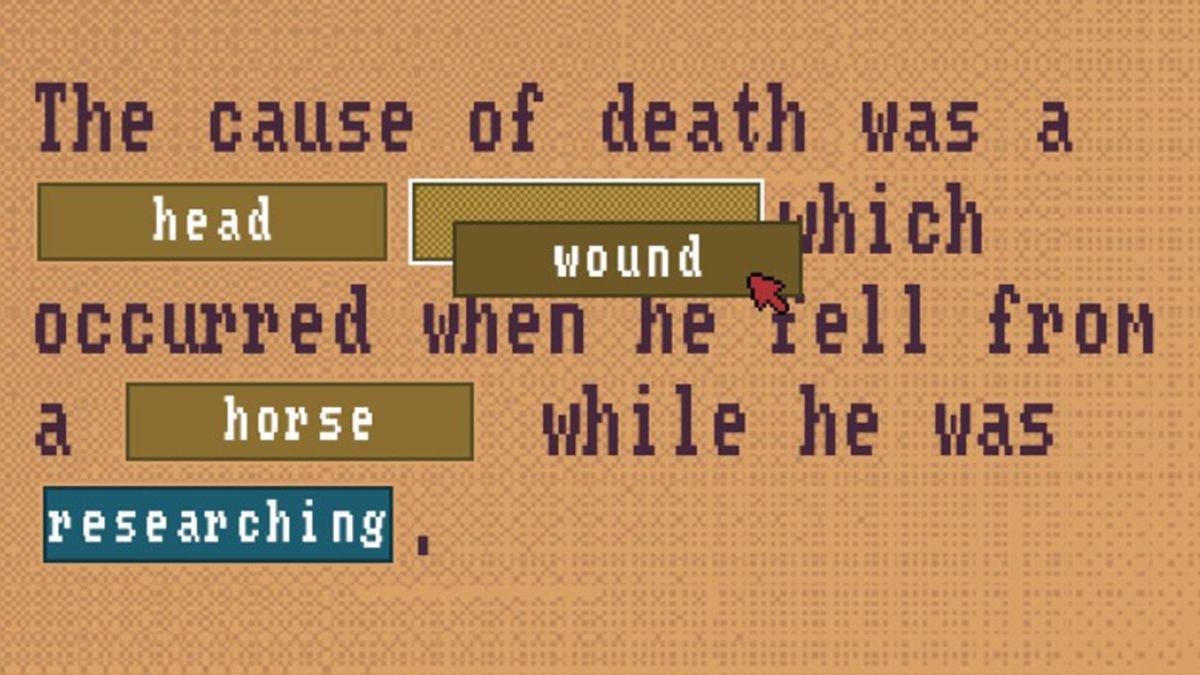There are some games where it’s nice to have a notebook handy: Elden Ring, Tunic, and Disney Dreamlight Valley come to mind. And then there are games where you need to have a notebook around. The Case of the Golden Idol is one of those games.
Developer Color Gray Games’ point-and-click detective mystery has drawn comparisons to Return of the Obra Dinn, and for good reason — it’s a tightly wound mystery that takes skill and precision to untie. The Case of the Golden Idol spans 40 years and 12 deaths in 18th-century high (and secret) society. At the center of it all is the mysterious golden idol — a tool of magic and intrigue that’s so powerful people are willing to murder and steal over it. The nature of the idol, and the people who want the power that comes with it, plays out in 11 static pixel-art scenes. Each level captures the moment of murder right at its impact — the moment a character erupts into a ball of flames or a woman’s poisoned at the dinner table, to name a couple. You’re the detective, tasked with filling in the blanks — literally on a separate screen with blank spaces dotted throughout a story — to figure out who was involved and how the murder unfolded.
Gameplay entails clicking around each increasingly complex scene and collecting key words and clues; this part of The Case of the Golden Idol is the “exploring” phase. The “thinking” phase is where you input what you’ve learned to solve the puzzles of each case; typically, The Case of the Golden Idol requires you to fill in a brief summary and label each of the people at the crime scene, alongside other details, like the meaning of arcane symbols or place settings at a meal.

Image: Color Gray Games/Playstack
The Case of the Golden Idol’s first few cases are overtly simple, and act as tutorials of sorts. The game opens to a man falling off a cliff as another guy looks on. There are two backpacks by a small camp. Both men have things in their pockets to inspect, and even more in their respective bags. In sifting through these characters’ possessions, you’re starting to weave the imaginary tapestry of these people’s lives, leading into the moments just before the murder.
But where does the notebook come in? Each of The Case of the Golden Idol’s cases are tightly packed with intricate things to look at, and sometimes small details will lead to revelatory developments in later cases. Plenty of logic puzzles accompany proceedings, including deducing who sat where at a table or how a dash of poison found itself in someone’s glass. I found it helpful to create “trees” of people, their motives, and interpersonal connections; The Case of the Golden Idol’s story spans decades in an aristocratic society where everyone is positioning themselves for power.
Understanding the gruesome nature of these characters’ search for power, and how that power warps society, is just as essential to solving the game as its logic puzzles. You can move freely back and forth between “exploring” and “thinking,” and that’s certainly helpful. Beyond that, The Case of the Golden Idol lets you even flip back into the menu screen to access other cases, too. There’s no rush on solving any case, and no penalties for seeking out help, either. There is a hint system that offers clues — still vague and full of riddles — designed to lead you toward answers. But the developer does caution the player from using this system without consideration; there’s no real reason given, but my best guess is that developer Color Gray wants players to take the time to consider each scene in depth, and arrive at Eureka! moments on their own.

Image: Color Gray Games/Playstack
As in many detective games, there’s a lot hidden throughout The Curse of the Golden Idol, as you observe one item intensely for minutes on end only to discern its true meaning once you’ve almost forgotten about it later on. This is a world composed of minutiae that gradually swirl into something much bigger, and the joy comes from stepping back to see the big picture. Color Gray Games has created a mystery tale in which every little thing seems essential, which is all the more impressive considering the sheer volume of information you’ll absorb by the end.
The Case of the Golden Idol is a game that makes me feel like a TV detective, slapping photos on a wall and drawing red lines between them. Those strings of yarn crisscross throughout my notebook, connecting characters and murder weapons and motives. It’s easy to get sucked into small details looking for a lead, but the feeling it gives when I’ve locked in the correct answers… It’s like I’m the most brilliant person on earth — even if just for a moment. The Case of the Golden Idol, like other deep detective games, expands past its own boundaries and into the pages of my notebook, leaving me thinking about its clues long after I’ve closed the game.
Curse of the Golden Idol was released on Oct. 13 on Windows PC. Vox Media has affiliate partnerships. These do not influence editorial content, though Vox Media may earn commissions for products purchased via affiliate links. You can find additional information about Polygon’s ethics policy here.















































